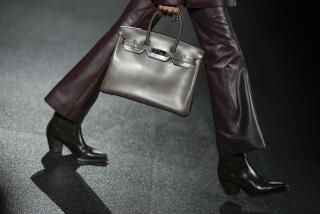At whose bidding?
- Share via
There may be no better advertisement for the principle of caveat emptor than EBay. The online auction house enables people to buy items of uncertain provenance from distant strangers, which is a decidedly risky business. Nevertheless, the public accepts it because EBay has developed mechanisms for buyers and sellers to protect themselves against unscrupulous users. Although those tools don’t work 100% of the time, they provide enough of a safeguard to draw millions of people through the company’s virtual doors.
Some copyright and trademark owners, however, complain that EBay isn’t doing enough to protect them. They’ve sued or threatened to sue the company for allegedly aiding the sale of bootlegged or counterfeit products and reaping a percentage of the revenue. Last week, a French court ordered EBay to pay more than $56 million to Louis Vuitton Malletier and Christian Dior for negligently failing to prevent the sale of bogus luxury goods. The court tacked on an additional $5 million in damages for allowing users to sell real brand-name perfumes despite the manufacturers’ requirement that the scents be sold only through authorized outlets. Meanwhile, a ruling is expected soon in a similar lawsuit brought against EBay in New York by high-end jeweler Tiffany & Co.
These court battles reflect the tension between intellectual property owners and a new generation of intermediaries made possible by the Internet: companies that provide a platform for the public’s commerce, communications or expression. The intermediaries succeed by amassing enormous numbers of users, who contribute content (e.g., products, blog posts or video clips) that attracts even more people to the platform. But the size and decentralized nature of these enterprises can also make it harder for intellectual property owners to enforce their trademarks and copyrights. So through the courts or lawmakers, they try to force the intermediaries to do the job for them. For example, France plans to require Internet service providers to cut off customers who are repeatedly accused of online piracy. And the major record labels are pushing to require Internet providers around the globe to detect and block unauthorized music downloads.
It’s in the public’s interest to have a healthy system of intellectual property rights, which can spur creativity and innovation by seeing that creators of works are paid for them. Yet spreading the burden of enforcing those rights onto those who don’t actively promote infringement and can’t easily (or accurately) detect them can have pernicious effects.
Consider EBay’s situation. The French court ruling could prompt the company, which says it spends more than $20 million annually to deter counterfeits, to abandon the French market or bar all sales in luxury product lines. Such moves would protect Vuitton’s trademarks but hurt the apparel and accessory companies that use the French EBay as their storefront, as well as the consumers who shop or resell goods there. There’s a fairness issue too. If Vuitton is responsible for enforcing its trademarks, the costs are passed on to Vuitton customers. If EBay has to enforce them, the costs will be borne by everyone who buys or sells there -- most of whom aren’t in the market for haute couture.
It’s not easy to find the right balance between protecting intellectual property and promoting new forms of commerce and communications. New technologies arrive continuously to make it either easier or harder to deter piracy. The principles that should guide policymakers, though, were well defined by the U.S. Supreme Court in the Sony Betamax ruling in 1984 and the Grokster decision in 2005. Technologies with substantial legitimate uses and online intermediaries that do not encourage people to infringe shouldn’t be forced to serve as copyright and trademark cops.
More to Read
Inside the business of entertainment
The Wide Shot brings you news, analysis and insights on everything from streaming wars to production — and what it all means for the future.
You may occasionally receive promotional content from the Los Angeles Times.










